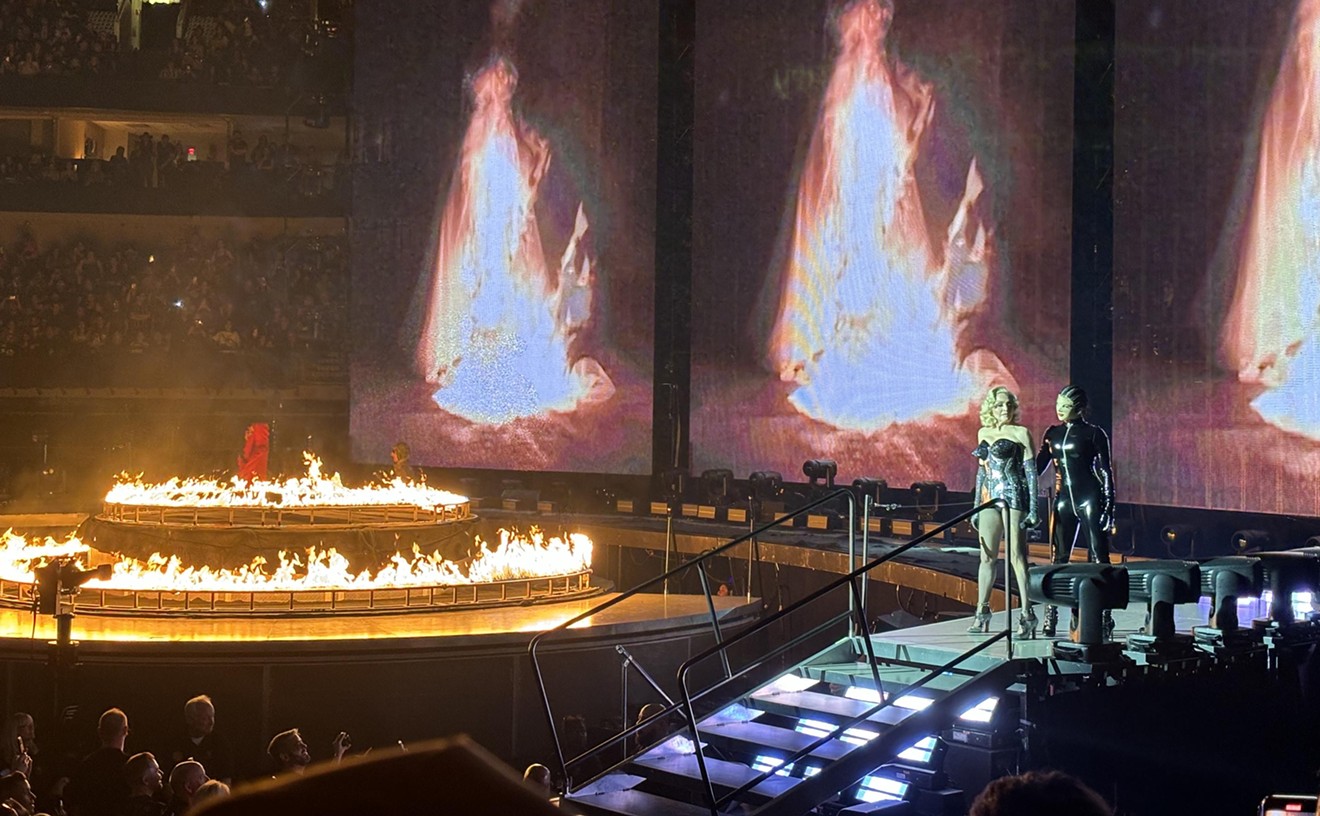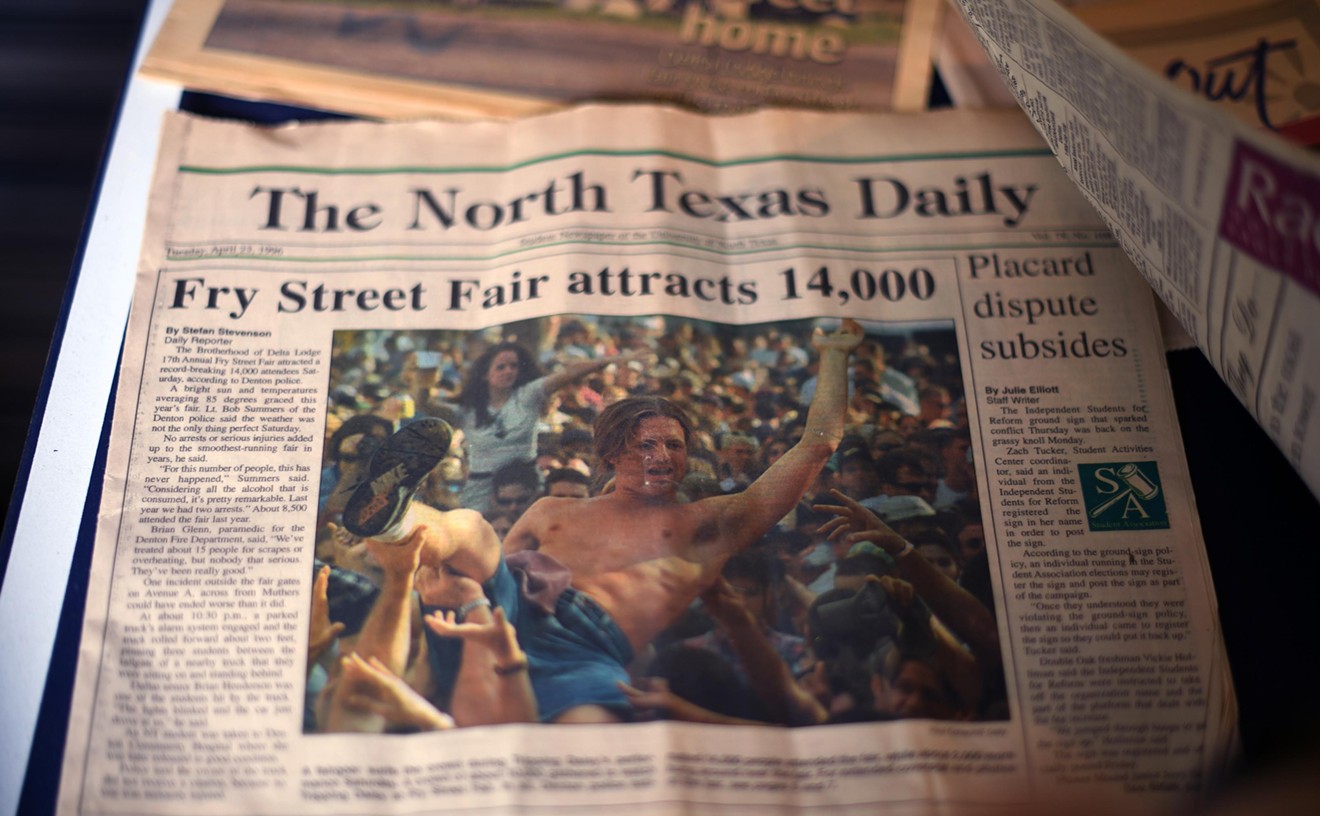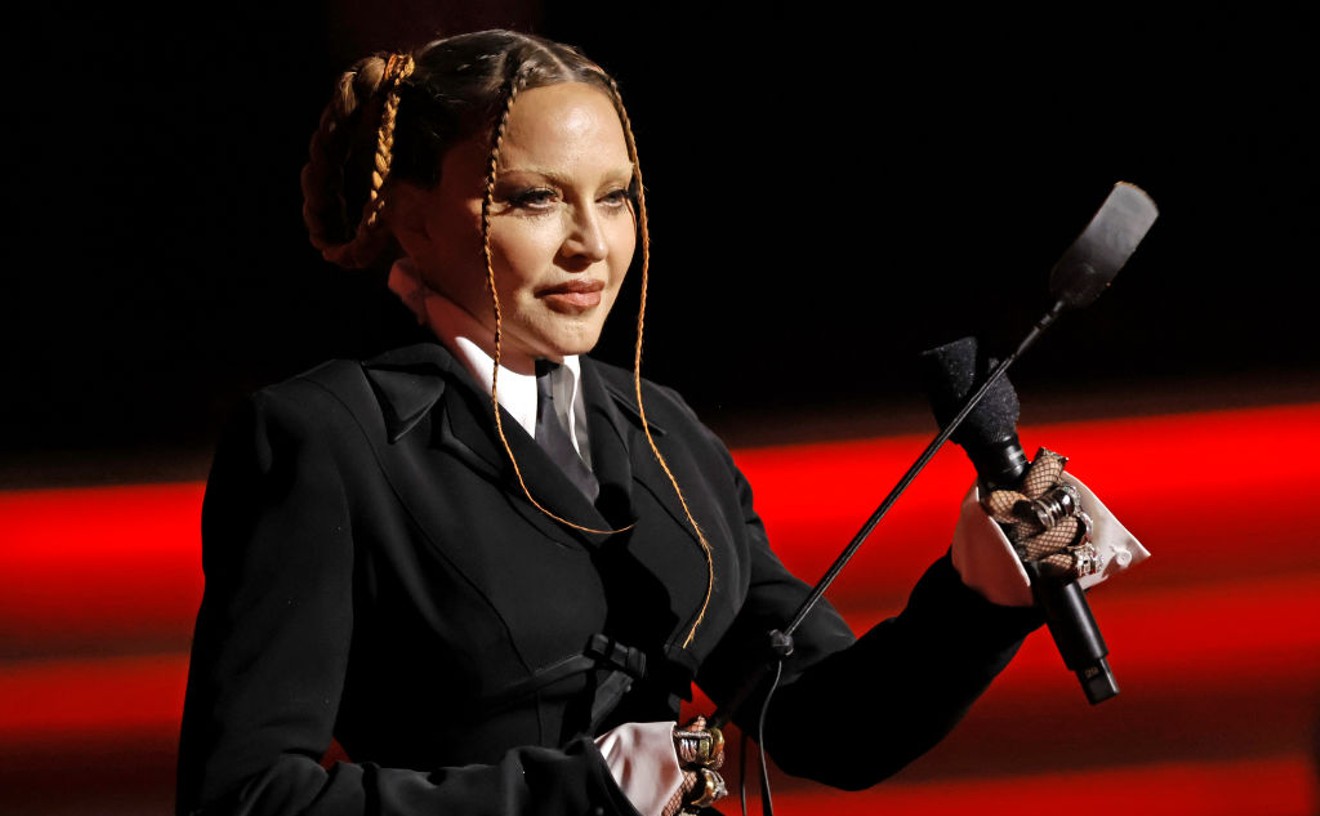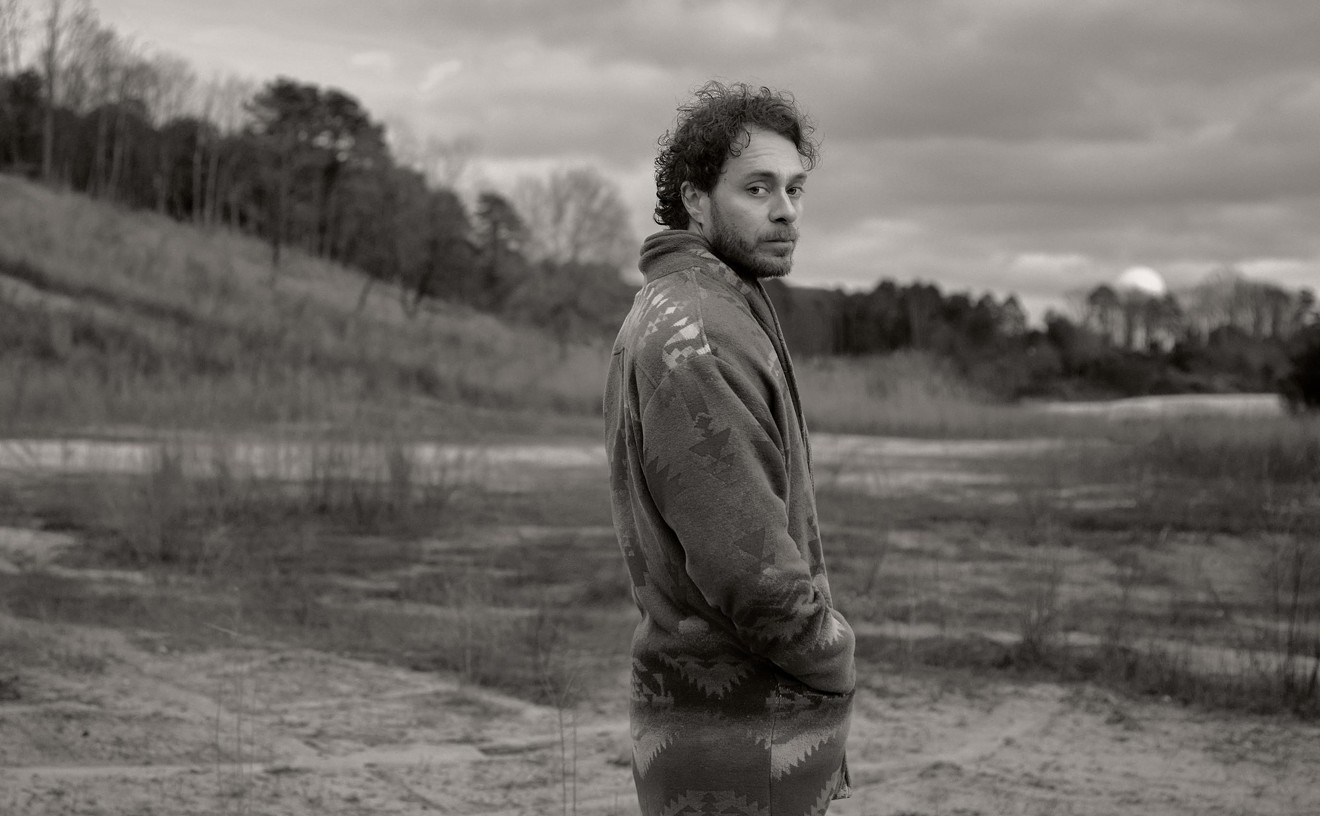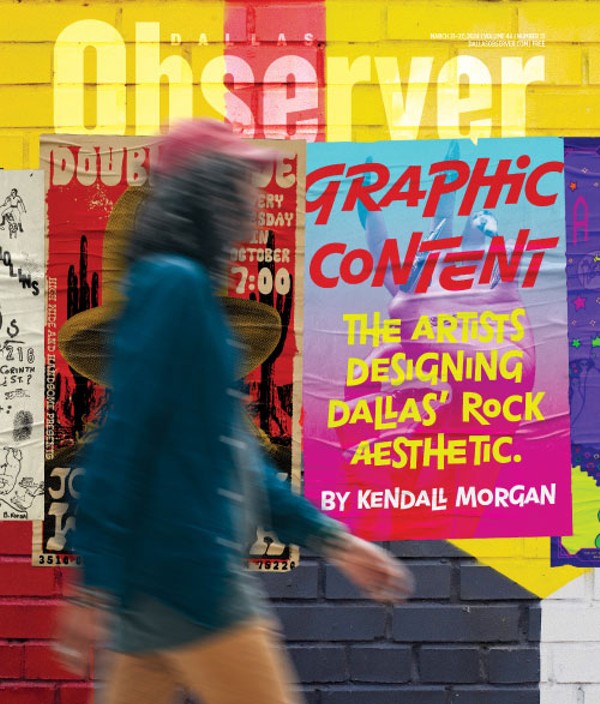But Roxy and his fascinating assortment of friends wrung as much out of life as they could during their time together, in every possible way. He was, first and foremost, a Native American activist. But he was also a poet, multimedia artist, and a fixture among the outlaw country set. And much of his life was a combination of it all.
For example, a couple of years back, my girlfriend Perla and I were in East Dallas on our way home from dinner, driving west down Oram Street toward Greenville Avenue. As we swung past Gordon's house at the southwest corner of the Matilda intersection, I noticed that the porch light was on and the front door was open. We decided to drop in for a minute and say hello. Roxy was like that: You could drop by his place any time you wanted, and he and his wife Judy would always welcome you inside and make you a drink.
As Perla and I walked up the steps that night, we could hear someone inside playing an acoustic guitar. The man started to sing in a flat, monotone voice, and he sounded a little drunk. As we got closer to the front door, it became obvious that it wasn't Roxy who was mumbling through "Pancho and Lefty," a song that I was beginning to recognize from one of my dad's old Willie Nelson records.
I peeked through the door at the intimate little gathering that was happening inside. There were seven or eight people strewn all over the living room, some holding vodka bottles, most smoking cigarettes. Roxy waved us in and Judy rose up to give us each a big hug. Man, it was just such a great vibe in that room. I could tell right away that we were in for something special that night.
The skinny guy in the corner with glasses and a beat-up guitar in his hands was Townes Van Zandt. For two hours he sat there and knocked out one amazing song after another, stopping only to do a shot of cheap vodka or light another Winston. The inside of Roxy's living room was like a thumbtacked museum of photos, books, and artifacts dedicated to Native American culture. It was absolutely the perfect place to hear Townes do his thing.
After about 10 or 15 songs and stories, I got up off the floor and went into the kitchen to fix a drink. A couple of minutes later, Roxy came in and sat down at the kitchen table. I wanted to seize the opportunity to tell him how much we appreciated his letting Perla and me in on this amazing little experience. We were pretty much awestruck by Van Zandt's rather intoxicated interpretation of his songbook.
"Damn, Jeff...can you guys take him with ya?"
What was that?
"He's been here for a damn week," Gordon explained. "He came to town to do some show at Poor David's, and he's been on our couch for days. We can't get rid of him. He thinks all he has to do is sit there in that chair and sing all night, and we'll put him up for however long he wants." Roxy poured himself another shot into his Styrofoam cup.
I laughed out loud. "No, man, I wish I could, but Perla and I are in the same boat Townes is," I said. "We just got back from Los Angeles, and we're staying in the room above the garage at my mother's house."
I thought about it for a second: Townes Van Zandt staying at my mom's house, sitting in our living room smoking cigarettes and singing songs until three in the morning for a week or so. Sure, she'd go for that.
"Well, damn it. I don't guess I'm ever gonna get to sit on my own damn couch again."
Roxy was smiling when he said it, half putting me on, certainly meaning no disrespect to one of his best friends in the world. I'm sure it was the vodka talking. It said a lot for him sometimes.
We left about three in the morning, but things were really just getting going, if you ask me. In the car on the way home that night, we agreed that we had just had one of those once-in-a-lifetime experiences. Even as passive, casual observers to the goings-on in Roxy Gordon's living room, we felt damn lucky to be able to hang out with a group of folks who were so unpretentious and real.
Townes, who shared a birthdate with Roxy, passed away a couple of months later.
Not long after that, the Gordons, along with their son Quanah, decided to move out to Roxy's grandmother's old house near Coleman, Texas, about four hours west of Dallas. By this time they had pretty much had enough of Dallas. "Wouldn't you leave Dallas, Texas?" Gordon asked the Dallas Observer a few months after moving ("Roxy redux, February 26, 1998). "I always planned to live out here or northern Montana, but I guess here is where I'm going to be for now."
Quanah and Judy also wanted to live out in the country. Roxy and his son had been building a smaller lean-to shack called the "House Up" for years before that, which sat on a bluff overlooking his grandmother's old place. It was a great place to write, and people would come out and drink all night, singing songs and carrying on. With no electricity or running water, built entirely by hand, the House Up was as close as Roxy could get to the clouds and stars. It was a radical departure from the life he had led while living in Dallas.
Over the years, Gordon became entrenched with a fairly odd cross-section of people from around here. Painter Frank X. Tolbert, Jr. and his wife Ann Stautberg were Roxy and Judy's seemingly constant companions. In fact, there is a portrait of the foursome painted on the wall in the back room at Terrilli's, down on Lower Greenville.
I met them all for the first time back in 1987, when I was booking the shows at Prophet Bar in Deep Ellum. Russell Hobbs and I were living in the loft space above the bar, and he liked to invite the four of them upstairs to drink and tell their stories after hours. I remember thinking at the time that Roxy looked like a biker, with his leather pants and that black bandanna tied around his head. He and Frank Jr. could drink anybody we knew under the table back in those days. Tolbert would play the washtub bass and provide backing music for Roxy's stories. These people were insane, and I loved hanging out with them.
Over the years, Roxy's peer group of Texas "folk artists" and drinking buddies included a surly cross-section of outlaw freaks that had each (in their own twisted way) redefined the word "subculture." Besides permanent sidekicks Tolbert and Van Zandt, there was David Allan Coe, Ray Wylie Hubbard, and former Nervebreakers and Rotten Rubber Band lead vocalist Tex Edwards. And somewhere along the way, Roxy crossed paths with snot-caked Stick Men With Ray Guns nuisance Bobby Soxx, and he came aboard as well.
Also included in Gordon's definitive circle of friends were Butch Hancock, Tommy Hancock, The Gourds' Max Johnston (who recorded 1990's Smaller Circles with him), Terry Allen, music writer Joe Nick Patoski, Jim "Reverend Horton Heat" Heath (who also lived on Oram), poets C.J. Berman and Charley Moon, Billy Joe Shaver, and visual artist Laney Yarber. He often shared stages with Van Zandt, Tolbert, Allen, Johnston, Richard Dobson, Diamond Jim Richman, Texanna Dames, and he even did a show at the old Major Theater with Erykah Badu's first performance art group, Soul Nation. Roxy Gordon had far more allies than enemies; he could hang with anyone.
One of Roxy's best friends was a local writer and poet named Robert Trammell, who is currently the executive director of WordSpace, a nonprofit arts and literary organization that often featured Roxy's work at a number of their gatherings. Trammell remembers seeing him for the first time about 15 years ago.
"I met him at his first house over on Palo Pinto in East Dallas," Trammell says. "I went over there with Frank and Ann Tolbert. I did not like him at first. Roxy and Judy had come to Dallas with David Allan Coe a couple of years before that. They had been on the road with him in some capacity that I was never sure of. I thought they must be gypsys or part of some kind of circus."
But what Trammell remembers the most is Roxy and Judy's first place here in Dallas.
"It was a little house at the back of the lot," he recalls. "One side of it was on a side street. There was this little camper parked in front with some kind of Indian drawings and words on it. I wound up living in that trailer for several months. They moved to the Oram house after that, seven or eight years ago." That particular house was like a living folk art landmark for a lot of people, who would stop or pull over to see the various animal hides or bone fragments that decorated the front porch.
Trammell and Gordon were also both active participants in the movement to free imprisoned Native American activist Leornard Peltier. They did several benefits over the years that featured, among others, Sara Hickman, local performance artist Fred Curchack, "Dollar" Bill Johnston (Michelle Shocked and Max Johnston's dad), Ray Wylie Hubbard, and of course, Townes Van Zandt. Native American culture was Gordon's sincere passion and obviously the essence and inspiration for most of his writing. Roxy was adopted into the Assiniboine tribe in Montana in the late-'60s, and was given the name "First Coyote Boy." Trammell describes Gordon's family tree as "one-half Choctaw, and one-half Texas Ranger...and half outlaw."
In his hilariously poignant song "Indians," Gordon split the world in two specific groups: That which was "Indian" (acceptable in his eyes), and that which "ain't." Making the cut as "Indians" were: Leonard Peltier, Chuck Berry, baseball, Willie Nelson, red meat, Hank Williams, street people, Pancho Villa, Los Angeles, Fort Worth, fry bread, Africa, Crazy Horse, Sitting Bull, poetry, circles and random lines, and "living." That which "ain't Indian" included Michael Jackson, Europe, JFK, proper punctuation, the president of Baylor University, football, New York City, health-food stores, General Custer, straight lines, Che Guevara, the FBI, and unions full of cops. The last words of the song are, "Expecting to live forever won't ever be 'Indian'..."
On the Marq's Texas Music Kitchen Web site (www.lonestarwebstation.com/roxygordon.html), there is a quote from Lubbock musician-artist Terry Allen that probably says it best.
"Roxy Gordon is one of the great outlaw artist misfits," Allen says. "He writes like an angel and sings like livin' hell. He's got a fine eagle tattoo on his arm, and I like his hat. His voice is as stone, true as the history of blood and dirt. In those mirrored shades he looks like the perfect cross between an ex-state trooper and a serial killer. He'll hate me for saying that...the state trooper part. Roxy is a brave and solid heart."
It was hard to believe that this soft-spoken old guy who was always sitting out on his front porch in East Dallas had really lived the kind of life that Roxy had. He wrote several books of poems and short stories, including Breeds and Some Things I Did. He also released three spoken word albums, Crazy Horse Never Died, Unfinished Business, and the one that was my particular favorite, Smaller Circles. I bought my first vinyl copy of Smaller Circles at the old Record Gallery store on Lower Greenville. It was an import, released on a label based in London. I think I paid 20 bucks for it. Roxy was living right down the street from me at the time and I didn't even know it. I wore that record out fast.
Over the years, Roxy's writing was featured in Rolling Stone and The Village Voice. He also often contributed to a UK publication called Omaha Rainbow. The late '60s and '70s found him hanging out with guys like Jim Morrison, author Richard Braughtigan, Leonard Cohen, Robert Creely, and Temple native Rip Torn. Like a lot of people at the time, he was living Jack Kerouac's On the Road, but he was living it better. He was both Sal Paradise and Dean Moriarty.
A few years after Some Things I Did came out in 1972, Roxy and Judy moved out to New Mexico for a spell and began publishing a country music magazine called Picking up the Tempo. It was there that he hooked up with Willie Nelson, Billy Joe Shaver, and Waylon Jennings. Roxy was right there in the thick of the "Texas Outlaw" country-rock movement, lending his rather concise perspective to the proceedings. He was Americana before the frat boys and washed-out middle-age punk rockers started turning it into their Highland Park version of Hee Haw.
Sometimes I get to thinking that people in Dallas tend to take some of our more "eccentric" citizens for granted. For instance, Tom Landry passed away a couple of days after Roxy did. There were huge headlines, specials on TV, and this city paused for a full week to hold a huge memorial for the former coach of the Dallas Cowboys. One after another, former football stars and various civic leaders praised Landry's Christian morals and ideals.
On the other hand, aside from what is left of his immediate family, there were fewer than 10 people from Dallas at Roxy Gordon's services in Coleman.
Both were men who were thoughtful and poised, determined, and firmly believed in their spiritual convictions. Both often led by example and loved their families deeply. Both men used an entertainment medium in an attempt somehow to teach greater "life" lessons. However, in this particular juxtaposition of "Cowboys and Indians," Tom Landry's lifestyle was celebrated, exalted, praised to the high heavens. Roxy Gordon's obituary in The Dallas Morning News took up less than six column inches, and not one of the local news broadcasts mentioned his passing. Make of it what you will.
Roxy would have been 55 years old on March 7 of this year. Survivors include his wife, Judy N. Gordon of Talpa, Texas, and his mother, Louise E. Gordon of Coleman. Other survivors include his adopted Assiniboine parents, John and Minerva Allen, and two sons and one daughter-in law, J.C. and Corinne Gordon of Dallas and Quanah Parker Gordon of Talpa. Roxy also had a twin brother that died at birth. J.C.'s wife Binky is expecting Roxy Gordon's first grandchild in four or five months.
Somewhere Roxy and Townes are knocking back a bottle of vodka, trading stories about all of the people they met and places they've been. That night I spent listening to Townes playing in Roxy's living room probably won't even register in the scope of their overall experiences. A hell of a lot of living went into those 55 years, and those who were close to Roxy feel lucky ever to have known the man.
As I'm driving home from work down Central Expressway, amidst all the traffic, billboards, concrete, pollution and confusion, one thing comes up as clear as the water in Coleman: Roxy Gordon was Indian, and many of the rest of us ain't.





